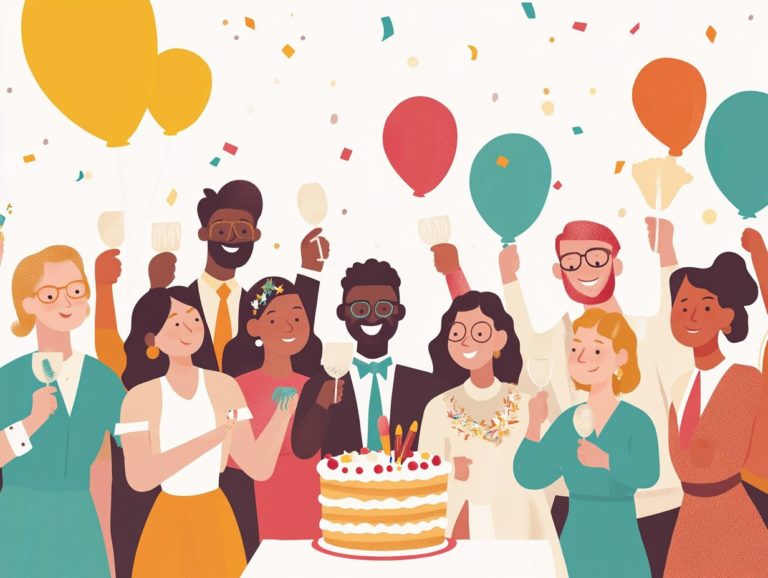The Role of Rituals in Celebrating Success
Celebrating success transcends mere moments of joy; it serves as an essential practice that reinforces your achievements and fuels your motivation.
Acknowledging your victories is important, and incorporating rituals can elevate this experience. This article outlines what a ritual entails and offers creative examples, guiding you in crafting personalized celebrations that truly resonate with you.
Let s dive into fun ways to make celebrations a part of your routine, ensuring that every triumph receives the recognition it rightfully deserves.
Contents
- Key Takeaways:
- The Importance of Celebrating Success
- Understanding Rituals
- Rituals for Celebrating Success
- Creating Personalized Rituals
- Incorporating Rituals into Daily Life
- Frequently Asked Questions
- What are rituals in celebrating success?
- Why are rituals important in celebrating success?
- What are some examples of rituals in celebrating success?
- Do rituals have to be elaborate to be meaningful?
- How do rituals enhance the celebration of success?
- Can rituals be used in different contexts to celebrate success?
Key Takeaways:

- Celebrating success boosts personal growth and motivation.
- Rituals provide a sense of closure and create lasting memories.
- Personalized rituals can be designed with meaningful elements that matter to you.
The Importance of Celebrating Success
Celebrating success is essential in both your personal and professional life. It nurtures a sense of belonging and reinforces shared customs that contribute to a vibrant culture.
By acknowledging accomplishments whether they are grand milestones or smaller victories you unlock personal happiness and enhance employee engagement. This leads to heightened productivity and morale in the workplace.
When companies prioritize these celebrations, they create environments where employees feel valued and connected to one another. This connection is vital for long-term success and transformational change within the organization.
Why Celebrating Success Matters
Celebrating your success is essential, as it enhances personal happiness and strengthens team bonds, ultimately contributing to a more cohesive corporate culture.
This practice is important for recognizing employees’ hard work, which research shows can increase productivity levels by approximately 20%. When you and your team take the time to celebrate achievements whether large or small it significantly boosts morale, creating a positive work environment.
Organizations that prioritize such recognition retain talent more effectively and cultivate a genuine sense of belonging. A study by Gallup revealed that employees who feel engaged and appreciated are 23% more likely to report job satisfaction, underscoring the profound impact of celebratory practices on workforce dynamics.
Understanding Rituals
Rituals are planned activities carried out in a specific sequence, laden with profound meaning. In diverse cultures, these rituals play a pivotal role in celebrating important life events, from secular festivities like New Year s Eve to other significant occasions that cultivate a sense of community belonging.
They serve as powerful instruments for enriching cultural heritage, fostering connections among individuals, and reinforcing the values and beliefs that unite a group.
Now that we understand rituals, let’s explore how to implement them in our lives.
Start your own celebration rituals today!
Defining Rituals and Their Purpose

Rituals are more than just repetitive actions; they are imbued with meaning and serve to reinforce cultural values and shared customs within your community.
These practices are vital for fostering social bonds and creating a profound sense of belonging and unity. For example, communal meals during religious holidays not only celebrate shared faith but also strengthen relationships among participants.
Rituals facilitate cultural transmission, allowing knowledge and values to be passed down from one generation to the next.
Consider graduation ceremonies; these events mark significant life transitions while instilling pride and a sense of identity in graduates. Beyond solidifying community ties, rituals also aid in personal transformation, helping you navigate life’s challenges.
By engaging in these practices, you can find deeper meaning, cultivate resilience, and contribute to both your personal growth and the collective identity of those around you.
Rituals for Celebrating Success
Rituals for celebrating success are essential for creating a vibrant workplace. They not only strengthen team bonds but also enhance morale while recognizing both individual and collective achievements.
These rituals can take many forms, from informal weekly check-ins and daily huddles to more structured annual celebrations of success.
By incorporating growth rituals and employee recognition into your company culture, you foster a positive environment that inspires motivation, engagement, and a genuine sense of belonging among your team members.
Powerful Rituals to Celebrate Your Success!
Successful organizations implement a variety of rituals to celebrate achievements, ranging from simple employee recognition programs to elaborate success celebrations that genuinely foster team bonding.
These practices not only acknowledge individual contributions but also cultivate a sense of accomplishment within your teams. For instance, a well-known tech giant holds a monthly Shout-Out session where employees recognize colleagues who have gone above and beyond, reinforcing a culture of appreciation.
Additionally, a leading retail company hosts quarterly achievement parties to bring teams together and celebrate collective milestones. This strengthens interpersonal relationships and enhances morale. Case studies show that such rituals lead to increased employee retention and productivity, proving their effectiveness in creating a motivated workforce.
Creating Personalized Rituals
Creating personalized rituals enables you to celebrate your unique achievements and significant life milestones. This nurtures a deeper sense of connection and motivation in both your personal and professional spheres.
These rituals can range from simple gratitude exercises to more elaborate celebrations that honor your successes. By integrating these personalized rituals into your daily routines, you cultivate a positive mental state and enhance your overall well-being, enriching the cultural fabric of your teams and communities.
Start your own celebration today!
How to Design Meaningful Rituals

Designing meaningful rituals requires a deep understanding of the values and experiences that resonate with you. This understanding allows you to celebrate your life milestones in a way that nurtures personal happiness and reinforces your cultural heritage.
This process not only helps you connect with your roots but also fosters a sense of community and belonging.
To create these rituals, start by identifying your personal values, as they often serve as guiding principles in your life. Next, consider the cultural backgrounds that shape your experiences. These traditions provide a rich framework that can enhance the ritual.
It s equally important to incorporate shared experiences, as they strengthen bonds among participants. For instance, some groups hold monthly gatherings to share stories, cultivating connections that reflect their collective journey.
By embracing these elements, you can craft rituals that truly resonate with your values and relationships.
Incorporating Rituals into Daily Life
Incorporating rituals into your daily routine is key to building habits that foster a positive mental state and elevate employee engagement how involved and motivated employees feel at work within your organization.
By integrating straightforward workplace rituals like daily huddles or weekly check-ins you can encourage open communication and craft an environment where everyone feels recognized and valued.
These rituals play a crucial role in solidifying a culture of continuous growth and support, ultimately driving the success of the organization.
Tips for Making Rituals a Habit
Making rituals a habit requires your intentional practice and commitment. This approach enables both you and your team to solidify daily rituals and elevate employee engagement.
To embark on this journey, it s vital to begin with small, manageable practices that seamlessly integrate into your existing routines. Encourage your team members to choose rituals that resonate personally with them, fostering a sense of ownership and commitment.
Creating a shared calendar for these rituals serves as a powerful reminder and provides a platform for tracking progress. Regular check-ins facilitate discussions around experiences, nurturing a culture of transparency and camaraderie.
As a leader, you play a pivotal role in this process. By modeling the desired behaviors and establishing an environment that supports consistent ritual formation, you can significantly enhance team connection and morale.
Frequently Asked Questions
What are rituals in celebrating success?

Rituals are actions that mark and honor achievements.
Why are rituals important in celebrating success?
Rituals serve as powerful reminders of our accomplishments, helping us to appreciate and reflect on our hard work. They also bring a sense of closure, allowing for a moment of celebration and gratitude.
What are some examples of rituals in celebrating success?
Examples include toasting with champagne, giving high-fives, lighting candles, ringing a bell, or creating a personalized handshake.
Do rituals have to be elaborate to be meaningful?
No, rituals do not have to be elaborate to be meaningful. The most important aspect is that it holds significance for the individual or group celebrating the success.
How do rituals enhance the celebration of success?
Rituals add depth and meaning to the celebration of success, creating a sense of unity and bringing people together to share in the joy of their achievements. Understanding why celebrating achievements is essential for growth can enhance this experience even further.
Can rituals be used in different contexts to celebrate success?
Yes, rituals can be used in various contexts personal, professional, or academic to honor accomplishments and milestones.






